Taxi Driver
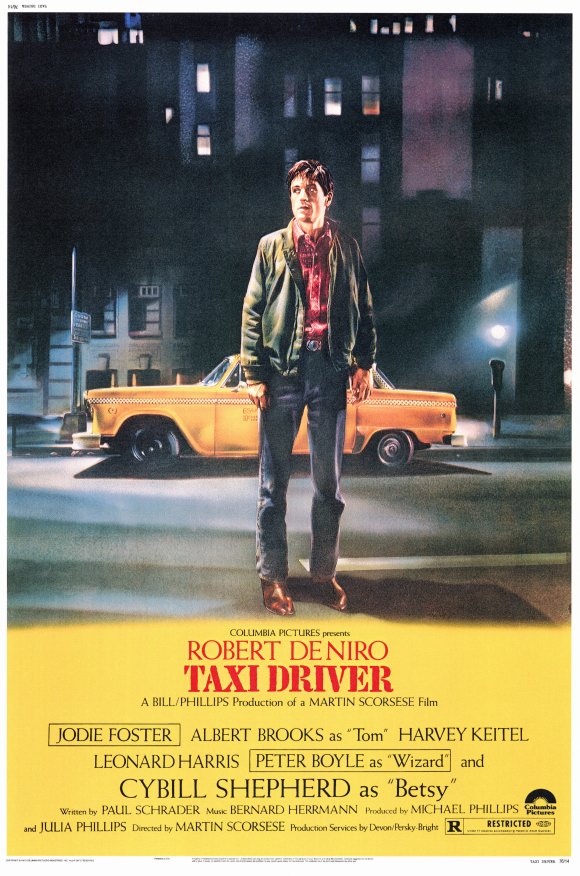 The culty acclaim of Martin Scorsese’s 1976 Taxi Driver is mostly deserved; the film is made up of some of the greatest scenes and moments of the decade. But with that there are some scenes and moments that don’t work as well. Really what Taxi Driver is is a good ol’ fashioned 70s exploitation flick, gussied up with a big-time director and cast. It’s a perfect combination of two of the era’s most potent B-movie formulas, “the crazy Vietnam vet” flick and “the New York city loner vigilante” saga. Two genres of exploitation pulp that go together like peanut butter and chocolate, after a while you can’t imagine one without the other. Like Scarlet O’Hara or Forest Gump, the name Travis Bickle has become a cultural definition of a type. Robert De Niro, at the peak of his thespian prowess, plays the lonely city taxi driver who prowls the street in search of some kind of meaning for his life. Teaming with Scorsese for the second time (after the brilliant Mean Streets, and with six more collaborations to come), it’s one of the great actor’s most iconic roles, and still a signature film for the director.
The culty acclaim of Martin Scorsese’s 1976 Taxi Driver is mostly deserved; the film is made up of some of the greatest scenes and moments of the decade. But with that there are some scenes and moments that don’t work as well. Really what Taxi Driver is is a good ol’ fashioned 70s exploitation flick, gussied up with a big-time director and cast. It’s a perfect combination of two of the era’s most potent B-movie formulas, “the crazy Vietnam vet” flick and “the New York city loner vigilante” saga. Two genres of exploitation pulp that go together like peanut butter and chocolate, after a while you can’t imagine one without the other. Like Scarlet O’Hara or Forest Gump, the name Travis Bickle has become a cultural definition of a type. Robert De Niro, at the peak of his thespian prowess, plays the lonely city taxi driver who prowls the street in search of some kind of meaning for his life. Teaming with Scorsese for the second time (after the brilliant Mean Streets, and with six more collaborations to come), it’s one of the great actor’s most iconic roles, and still a signature film for the director.
As a guy who doesn’t need sleep and doesn’t mind venturing in to the rougher sides of town, Travis is instantly hired as a cabbie. He learned some of the ropes from colleagues over late night coffee stops, led by Wizard (go-to working class character actor Peter Boyle). His clientele ranges from the high end to creeps (Scorsese in a fantastic scene), and pimps and hookers—that’s where he meets and becomes kinda obsessed with Iris (Jodie Foster), a teenage hooker who was briefly fleeing her pimp, Sport (Harvey Keitel). He also strikes up a near romance with a beautiful campaign worker, Betsy (Cybill Sheperd), who works for senator Palantine (Leonard Harris). Though her coworker (Albert Brooks) has his doubts about Travis, she agrees to go out with him. He blows it when he idiotically takes her to see a porn movie. Getting blown off by her gives him more time to fret over Iris; his obsession with her does not seem to be sexual, he just has a high moral code and feels like he can help her. And he sinks deeper into a type of self-obsessed heroic fantasy. After killing a guy who attempts to rob a grocery store his itch for more action grows so he gives himself a Mohawk hairdo and makes a feeble attempt at shooting Palantine. Instead, when that doesn’t work out he goes after Iris’s pimp, culminating in an extremely bloody shoot-out with him and the whorehouse manager in front of Iris, where he kills both of them and gets shot up himself.
The Queen
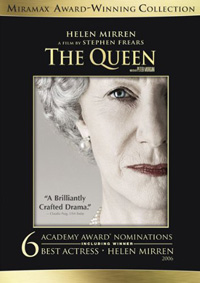 Playwright and screenwriter Peter Morgan has become one of the top chroniclers of odd-couple conflicts just below the surface of history's reach during the last couple decades. The Last King of Scotland was about the relationship between Ugandan dictator Idi Amin and his young Scottish doctor. Frost/Nixon chronicled the details of the famous filmed conversations between the broadcaster and the disgraced ex-president. Morgan's television movie, The Deal, directed by Stephen Frears, contrasted the difference between two British politicians, Gordon Brown and Tony Blair. As a follow-up, Morgan, Frears, and actor Michael Sheen, who perfectly captures Blair in looks and spirit, re-teamed with The Queen. This time Blair is a supporting character on screen, though still a vital half of another mismatched odd couple with Queen Elizabeth II, played brilliantly by Helen Mirren. The Queen details how Blair just might have saved the royal family from total irrelevancy after their reluctance to acknowledge Princess Diana after her death.
Playwright and screenwriter Peter Morgan has become one of the top chroniclers of odd-couple conflicts just below the surface of history's reach during the last couple decades. The Last King of Scotland was about the relationship between Ugandan dictator Idi Amin and his young Scottish doctor. Frost/Nixon chronicled the details of the famous filmed conversations between the broadcaster and the disgraced ex-president. Morgan's television movie, The Deal, directed by Stephen Frears, contrasted the difference between two British politicians, Gordon Brown and Tony Blair. As a follow-up, Morgan, Frears, and actor Michael Sheen, who perfectly captures Blair in looks and spirit, re-teamed with The Queen. This time Blair is a supporting character on screen, though still a vital half of another mismatched odd couple with Queen Elizabeth II, played brilliantly by Helen Mirren. The Queen details how Blair just might have saved the royal family from total irrelevancy after their reluctance to acknowledge Princess Diana after her death.
After the humiliating divorce between Prince Charles and Princess Diana, England’s monarchy might need to ask itself some hard questions, but Queen Elizabeth won't have it. When the touchy-feely Tony Blair, England’s answer to Bill Clinton, was elected Prime Minister in 1997 with promises to modernize the country, it sent shivers up the spines of the royal family. A few months after getting elected and an awkward first meeting with the Queen, they are both at the center of a storm when Diana and her playboy boyfriend, Dodi Fayed, are tragically killed in a Paris car accident. The royal family have no idea how to react. The Queen resorts to her WWII “stiff upper lip” posture: say nothing, show no emotion, and just stay out of the public eye. Tradition! Diana was no longer part of the royal family, so it was not her concern. But Blair understood the modern sensibility of public mourning and after dubbing her “the People’s Princess” his numbers skyrocket while the Queen’s coldness sinks her.
In The Heat Of The Night
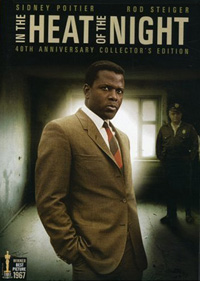 The racial politics of In The Heat Of The Night may not be as shocking or edgy today as they were back in the bad old days of 1967. Matter of fact, it may even be a little corny and perhaps the drama can feel obvious, but as a piece of detective pulp it’s solid, and as a showcase for the great Rod Steiger at his scenery-chewing best it’s more than watchable. This was a period full of Southern dramas with some then socially hot elements - Hurry Sundown, ...tick…tick… tick…, The Liberation Of L.B. Jones, The Klansman, even The Chase. While those films are all utterly dated (they would seem a little more brave if they had been produced ten year earlier), In The Heat Of The Night holds up fairly well, because it’s a mystery film first, with a lot of style, and an all-star team behind the camera. It’s also the best of Sidney Poitier’s groundbreaking run of films in the '60s that made him the first black box office superstar.
The racial politics of In The Heat Of The Night may not be as shocking or edgy today as they were back in the bad old days of 1967. Matter of fact, it may even be a little corny and perhaps the drama can feel obvious, but as a piece of detective pulp it’s solid, and as a showcase for the great Rod Steiger at his scenery-chewing best it’s more than watchable. This was a period full of Southern dramas with some then socially hot elements - Hurry Sundown, ...tick…tick… tick…, The Liberation Of L.B. Jones, The Klansman, even The Chase. While those films are all utterly dated (they would seem a little more brave if they had been produced ten year earlier), In The Heat Of The Night holds up fairly well, because it’s a mystery film first, with a lot of style, and an all-star team behind the camera. It’s also the best of Sidney Poitier’s groundbreaking run of films in the '60s that made him the first black box office superstar.
In Sparta, Mississippi patrolman Sam Wood (the great character actor Warren Oates) makes his nightly rounds, after peeping at a topless woman he makes a startling discovery – the murdered body of wealthy Industrialist, Philip Colbert. Newly installed police chief Bill Gillespie (Steiger) sends him to check out the pool hall and bus station for any drifters, and wouldn’t you know it, Wood finds a well-dressed black man with a wallet full of bills waiting for a bus. The cops think they have an open and shut case, until they find out the black man, with a clear alibi, is actually Virgil Tibbs (Poitier), a Philadelphia homicide detective just passing through. The fact that he makes more money than them, is obviously smarter and is black throws these backwoods hicks for a loop. Tibbs wants to leave town but after clearing another wrongly accused guy, he impresses the deceased man’s wife, Leslie Colbert (Lee Grant), and she puts pressure on Gillespie to keep Tibbs on the case. And of course, Tibbs’ super-sleuthing leads to budding respect from the otherwise racist cops.
All The President’s Men
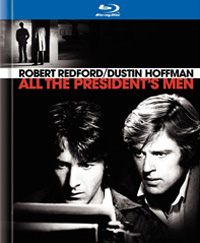 Watching the recent excellent documentary, Page One: Inside The New York Times, which questioned the potential end of print media and mature fact-based journalism, made me hanker to rewatch the greatest film about how journalists can seek the truth, and the standards and hoops they need to jump through in order to have their stories reported. Based on the true-story, autobiographical, political thriller by journalists Carl Bernstein and Bob Woodward, All The President’s Men details the young reporters' involvement in the Watergate scandal that worked its way through the cover-ups run by President Nixon’s staff, eventually reaching him and ending his presidency prematurely. All The President’s Men is a riveting account of the Watergate story from war zone reporters covering it, but today it’s also a reminder of the hard work and fact checking that goes into the coverage by these old dinosaurs, in this case the Washington Post, and the good that old media can sometimes bring to our democracy.
Watching the recent excellent documentary, Page One: Inside The New York Times, which questioned the potential end of print media and mature fact-based journalism, made me hanker to rewatch the greatest film about how journalists can seek the truth, and the standards and hoops they need to jump through in order to have their stories reported. Based on the true-story, autobiographical, political thriller by journalists Carl Bernstein and Bob Woodward, All The President’s Men details the young reporters' involvement in the Watergate scandal that worked its way through the cover-ups run by President Nixon’s staff, eventually reaching him and ending his presidency prematurely. All The President’s Men is a riveting account of the Watergate story from war zone reporters covering it, but today it’s also a reminder of the hard work and fact checking that goes into the coverage by these old dinosaurs, in this case the Washington Post, and the good that old media can sometimes bring to our democracy.
Aggressive young reporter Bob Woodward (Robert Redford) is put on the story of a small time, but suspicious burglary of the Democratic party headquarters at the Watergate Building in Washington DC. What makes the case more intriguing to Woodward and his superiors at the Washington Post is that the burglars all have pre-arranged high powered lawyers. He then discovers that the burglars have ties to the CIA and White House, meaning this wasn’t any old burglary; it was an attempt to bug the Democrats. Always poking his head in at the news room is the sloppier, but equally driven reporter, Carl Bernstein (Dustin Hoffman). He eventually gets himself teamed up with Woodward and as the two work to crack the case it continually takes them up the White House ladder all the way to President Nixon (“Tricky Dick”).
King of the Gypsies
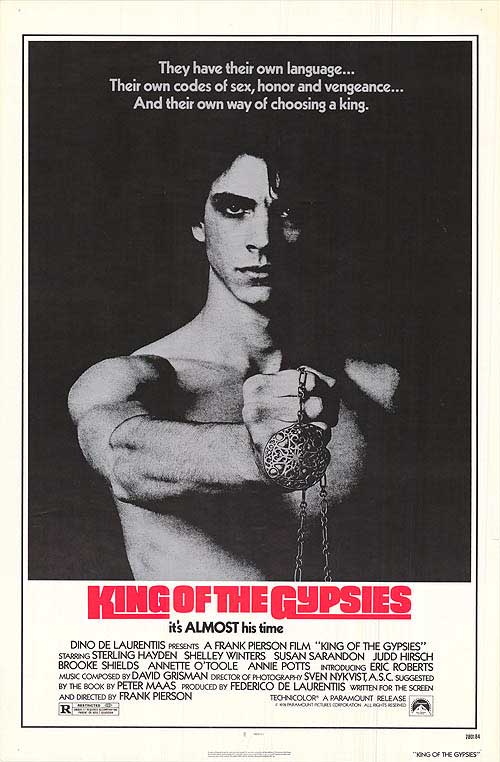 Due to a lack of high quality competition, King of the Gypsies is still the quintessential American fiction film about modern day gypsies, that is if you're old enough to think of 1978 as “modern day” (while the best non-fiction flick has to be Robert Duvall’s little seen documentary Angelo My Love). Based on a novel by Peter Maas (Serpico), King of the Gypsies reeks of importance and epic pretensions; but besides the cultural curiosity what actually makes the movie worthwhile and totally entertaining is the ham fisted act-off going on up on the screen. From Elia Kazan’s Streetcar Named Desire to Clint Eastwood’s Mystic River there’s a long tradition of method acting emoters chewing scenery and King of the Gypsies has its share of hungry thespians eager to chew. Heading the cast in his film debut the young pretty-boy Eric Roberts, pouting and brooding (but even under a teary-eyed tortured sulk the guy has chops and acts up a storm), doing what he can to keep up with his co-stars Susan Sarandon and Judd Hirsch who are totally over the top, with legendary ultra-hams Sterling Hayden and Shelly Winters nipping at their heels. Any film where Michael V. Gazzo (Frank Pentangeli in the Godfather: Part II) is an example of restraint in his one early scene, you know this is going to be some histrionic fun.
Due to a lack of high quality competition, King of the Gypsies is still the quintessential American fiction film about modern day gypsies, that is if you're old enough to think of 1978 as “modern day” (while the best non-fiction flick has to be Robert Duvall’s little seen documentary Angelo My Love). Based on a novel by Peter Maas (Serpico), King of the Gypsies reeks of importance and epic pretensions; but besides the cultural curiosity what actually makes the movie worthwhile and totally entertaining is the ham fisted act-off going on up on the screen. From Elia Kazan’s Streetcar Named Desire to Clint Eastwood’s Mystic River there’s a long tradition of method acting emoters chewing scenery and King of the Gypsies has its share of hungry thespians eager to chew. Heading the cast in his film debut the young pretty-boy Eric Roberts, pouting and brooding (but even under a teary-eyed tortured sulk the guy has chops and acts up a storm), doing what he can to keep up with his co-stars Susan Sarandon and Judd Hirsch who are totally over the top, with legendary ultra-hams Sterling Hayden and Shelly Winters nipping at their heels. Any film where Michael V. Gazzo (Frank Pentangeli in the Godfather: Part II) is an example of restraint in his one early scene, you know this is going to be some histrionic fun.
A New York and Pennsylvania gypsy clan is led by Zharko (Hayden); he claims to live like a millionaire who’s never done an honest day’s work in his life. The nomadic gypsies live without birth certificates, driver’s licenses, or paying taxes; they are proud criminals, scam artists, thieves, card sharks, insurance frauders and phony fortunetellers and by the late ‘70s they’ve settled in NYC where the real action is. Zharko’s son Groffo (Hirsch), the heir to the king, is considered a joke of a man; he’s a gambler and abusive to his wife Rose (Sarandon), who is the real talent in the family when it comes to the con. Zharko is dying and wants to skip his son and pass the leadership to his grandson Dave (Roberts), which has Groffo in a snit. The problem is Dave, like Michael in The Godfather, has ambitions to break away from the family and become a model citizen; he even has a non-gypsy girlfriend, Sharon (Annette O’Toole, in this era a go-to actress for all-American girlfriend roles). Under Zharko’s orders Dave is lured back to the family to protect his little sister Tita—
Baby It's You
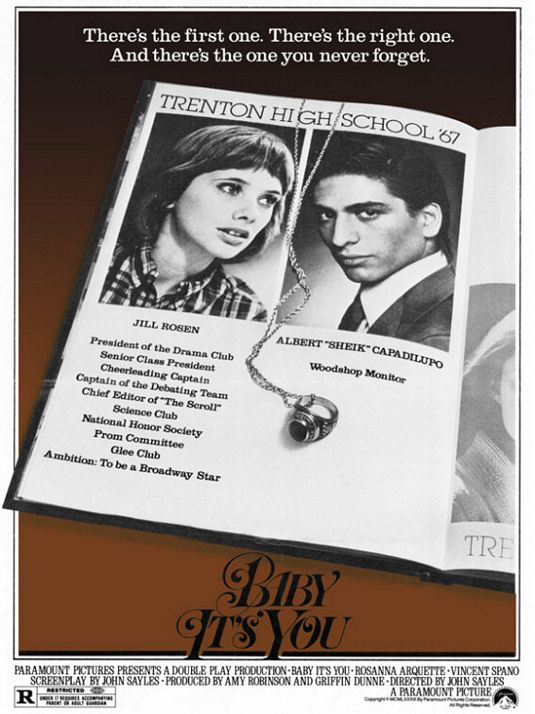 In 1966, Trenton New Jersey still seemed stuck in the cross hairs of the ‘50s and ‘60s. The British Invasion was in full effect and white kids were now listing to black music but the era of Frank Sinatra still held sway with some. For high school senior Jill Rosen (Rosanna Arquette) it’s a particularly confusing era; an aspiring actress, she is trying to embrace the times, find her own voice, and gain her independence, but when she is wooed by and then eventually gets in a relationship with an odd, new, rebelliously hunky greaser at school, known as Sheik (Vincent Spano), her place in the world, her values and aspirations, are challenged. Even after Jill goes away to college and her experiences are expanded, he still lingers in her mind as a representation of her past, a life she can’t quite outgrow.
In 1966, Trenton New Jersey still seemed stuck in the cross hairs of the ‘50s and ‘60s. The British Invasion was in full effect and white kids were now listing to black music but the era of Frank Sinatra still held sway with some. For high school senior Jill Rosen (Rosanna Arquette) it’s a particularly confusing era; an aspiring actress, she is trying to embrace the times, find her own voice, and gain her independence, but when she is wooed by and then eventually gets in a relationship with an odd, new, rebelliously hunky greaser at school, known as Sheik (Vincent Spano), her place in the world, her values and aspirations, are challenged. Even after Jill goes away to college and her experiences are expanded, he still lingers in her mind as a representation of her past, a life she can’t quite outgrow.
Director John Sayles had been a wonderful screenwriter of campy B-movies (Piranha, Alligator and The Howling), but as a director he made a name for himself with his deeply personal, character-driven independent films Return of the Secaucus Seven (which The Big Chill has been accused of ripping-off) and Lianna. Though Baby It’s You brought the quality of his style up a few notches, it was still a very small-budget flick. The New Jersey connection explains why the film’s soundtrack is loaded with early Bruce Springsteen music, which unfortunately now gives the film a ‘70s vibe; but other than that the 1966 period detail is perfect, not just in the design but the characters’ emotional makeup.
The Boost
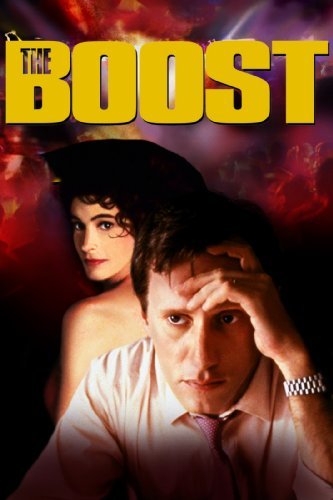 There's something comforting in movies about a small-time guy who ends up making it big despite the odds. But, as the Horatio Alger Myth goes, that small-time guy usually squanders his chance at sustaining wealth and power. The Boost is about Larry Brown (James Woods), a rigid freelance salesman based out of New York. He's too busy doubting himself and making his situation appear more glorious than it actually is—so busy that he doesn't realize that he's found what most people look for their entire lives: unconditional true love.
There's something comforting in movies about a small-time guy who ends up making it big despite the odds. But, as the Horatio Alger Myth goes, that small-time guy usually squanders his chance at sustaining wealth and power. The Boost is about Larry Brown (James Woods), a rigid freelance salesman based out of New York. He's too busy doubting himself and making his situation appear more glorious than it actually is—so busy that he doesn't realize that he's found what most people look for their entire lives: unconditional true love.
Based on the book Ludes: A Ballad of the Drug & the Dream by Ben Stein, the story is one of those “boys and girls get off the bus to come to L.A.” tales that leaves your mind fuzzy and with a bitter taste in your mouth. Lenny was lucky enough to find a gorgeous, hard-working woman to marry him and believe in him—even when he makes a fool of himself. With his risky profession as a salesman and hers as a paralegal, the two did alright for themselves. While figuratively drowning during a particular sale and groping for a lifeline, he ends up catching the eye of Max Sherman: a man gifted at taking little fish and turning them into soaring birds. Sherman works in Southern California real estate and wants the over-achieving Lenny on his team. So Lenny starts seeing dollar bills and asks his wife Linda (Sean Young) to take a risk with him and move to Los Angeles.
Midnight Express
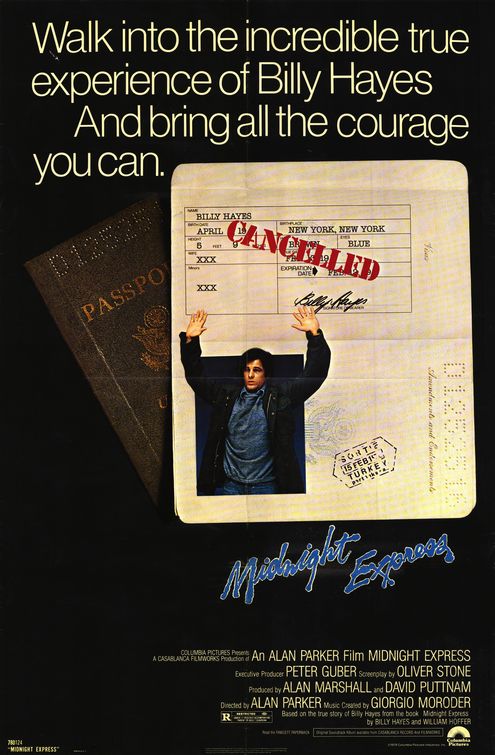 In what may be the Citizen Kane of xenophobia-ploitation flicks of the ‘70s, no matter how manipulative, hateful, and offensive Midnight Express may be, it’s also some amazingly intense filmmaking. After his first feature film, the misfire kiddie musical Bugsy Malone, British director Alan Parker announced himself as a major talent with Midnight Express, as did the obscure screenwriter Oliver Stone, who won an Oscar for his adaptation of Billy Hayes’s autobiographical account of his traumatic years in a Turkish prison. Though Stone famously spiced up the account to make it even more dramatic and has since even apologized to the people of Turkey for making them look like slimy monsters, the film is still an edge-of-your-seat piece of entertainment.
In what may be the Citizen Kane of xenophobia-ploitation flicks of the ‘70s, no matter how manipulative, hateful, and offensive Midnight Express may be, it’s also some amazingly intense filmmaking. After his first feature film, the misfire kiddie musical Bugsy Malone, British director Alan Parker announced himself as a major talent with Midnight Express, as did the obscure screenwriter Oliver Stone, who won an Oscar for his adaptation of Billy Hayes’s autobiographical account of his traumatic years in a Turkish prison. Though Stone famously spiced up the account to make it even more dramatic and has since even apologized to the people of Turkey for making them look like slimy monsters, the film is still an edge-of-your-seat piece of entertainment.
Along with his compatriots Ridley Scott and Adrian Lyne, director Parker would usher in a new era of filmmakers who came out of a commercial background. Like most of his pals’ films of the era, though, Midnight Express and a number of his other films are heavy on grit and realistic detail but there still seems to be a slight gloss over their work that sometimes makes their films, no matter how gritty, look like champagne commercials. But still Parker has had a most fascinating career, peeking early with Midnight Express and then following with a run in the 1980s with Fame, Shoot the Moon, Pink Floyd The Wall, Birdy, and then Angel Heart and Mississippi Burning—all pretty good movies. But for an immigrant, it ‘s a distinctly American resume, and in some ways Midnight Express is his most American film in terms of values and the naively dim view most Americans have on the rest of the world.
Paper Moon
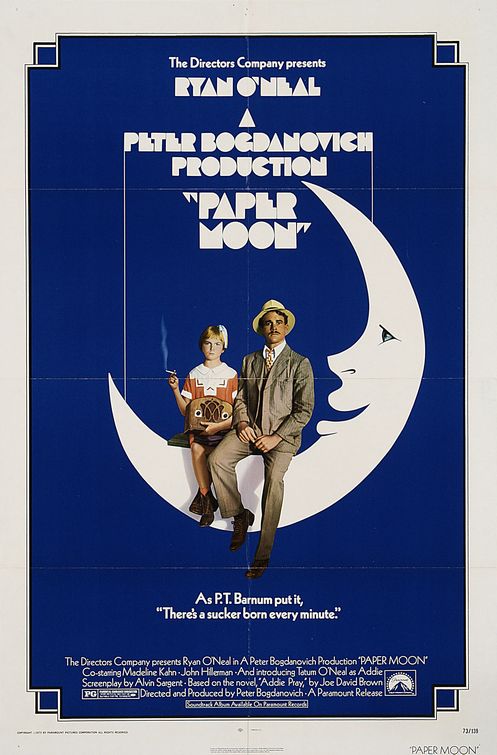 Along with The Sting, Paper Moon, made a few years earlier, may be the quintessential Depression-era conman film. But while The Sting, though terrific, was more of a gimmicky star vehicle, Paper Moon has even more heart than con. In the best role of his career, Ryan O’Neal (once upon a time he was actually a superstar) stars opposite his real-life daughter Tatum O’Neal. At just eight-years-old, she gives one of the most acclaimed child performances ever. Director Peter Bogdanovich was working at the peak of his powers, fresh off the brilliant The Last Picture Show and the popular What’s Up, Doc? He vividly recreates the flat, lonely landscapes of 1930s Kansas; shooting in beautiful black & white, the period detail is as good as any modern film has ever done.
Along with The Sting, Paper Moon, made a few years earlier, may be the quintessential Depression-era conman film. But while The Sting, though terrific, was more of a gimmicky star vehicle, Paper Moon has even more heart than con. In the best role of his career, Ryan O’Neal (once upon a time he was actually a superstar) stars opposite his real-life daughter Tatum O’Neal. At just eight-years-old, she gives one of the most acclaimed child performances ever. Director Peter Bogdanovich was working at the peak of his powers, fresh off the brilliant The Last Picture Show and the popular What’s Up, Doc? He vividly recreates the flat, lonely landscapes of 1930s Kansas; shooting in beautiful black & white, the period detail is as good as any modern film has ever done.
Paper Moon is based on the novel Addie Pray by Joe David Brown (Kings Go Forth), with the screenplay by Alvin Sargent, whose massive screenwriting career ranges from Ordinary People to the recent Spider-Man sequels. Moses Pray (Ryan) is a two-bit conman. He thinks he can make a buck when, after the funeral of a one-time lover, he agrees to accompany the woman’s eight-year-old orphaned daughter, Addie (Tatum), to the train station where she will be shipped off to a distant family. She realizes that he has scammed her out of her inheritance money, so to pay him back the two end up joining up on a cross-country con job. At first they’re at odds but eventually Moses comes to realize that Addie is just as skilled at the con as him and just as cunning as and maybe even bolder than him.
Kes
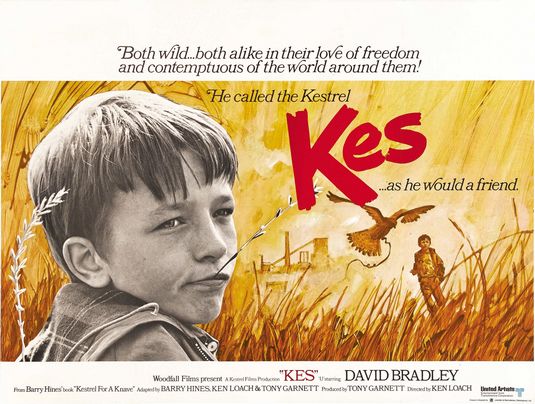 For a long time the belief held between parents and educators alike was fairly simple: “spare the rod, spoil the child.” In our modern world, at least in the West, those who work with and/or rear children seem to be desperately trying to find some common ground when it comes to disciplinary matters. And when each generation reaches adulthood, or more appropriately middle age, the majority looks at the youth around them as a mass of spoiled delinquents. They refuse to understand the new pastimes, music and general attitudes toward life and responsibilities. It makes you wonder if there is ever any truth to this popular argument. Do the youth of every nation grow more reckless across generations, or are they simply misunderstood?
For a long time the belief held between parents and educators alike was fairly simple: “spare the rod, spoil the child.” In our modern world, at least in the West, those who work with and/or rear children seem to be desperately trying to find some common ground when it comes to disciplinary matters. And when each generation reaches adulthood, or more appropriately middle age, the majority looks at the youth around them as a mass of spoiled delinquents. They refuse to understand the new pastimes, music and general attitudes toward life and responsibilities. It makes you wonder if there is ever any truth to this popular argument. Do the youth of every nation grow more reckless across generations, or are they simply misunderstood?
Ken Loach tries to shed some light on this concept with his adaptation of Barry Hines's novel, A Kestrel for a Knave. In the film we follow Billy Caspar (David Bradley), an adolescent marked as the village idiot who turns out to be anything but. He enjoys taking it easy; exemplifying what behaviorists might consider to be a relaxed personality. He's the local paperboy in his village, but instead of building a good work ethic he reads the cartoon section of the paper over a pint of stolen milk when he should be doing his rounds. His impulse to steal seems somewhat merited by his impoverished existence within a harsh class system, and the fact that he mainly steals food and literature. He doesn't shower, nor does he wear underpants. He lives with his single mother (Lynne Perrie) and has to share a small bed with his crass older brother Jud (Freddie Fletcher) who works in the mines and bullies his family. At school he spends most his time daydreaming and falling asleep from exhaustion. He's an easy target to be made an example of by his teachers who refuse to tolerate his devil-may-care attitude. When not being hit with a ruler or mocked by his teachers in class for his presumably insolent behavior, he's bullied by a group of boys who he used to hang with.





